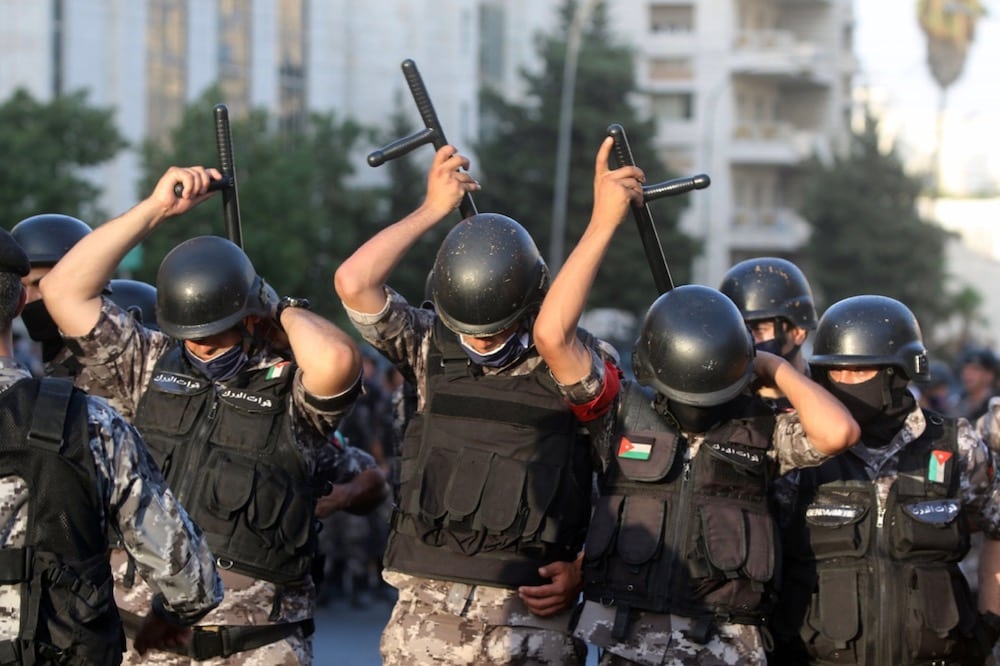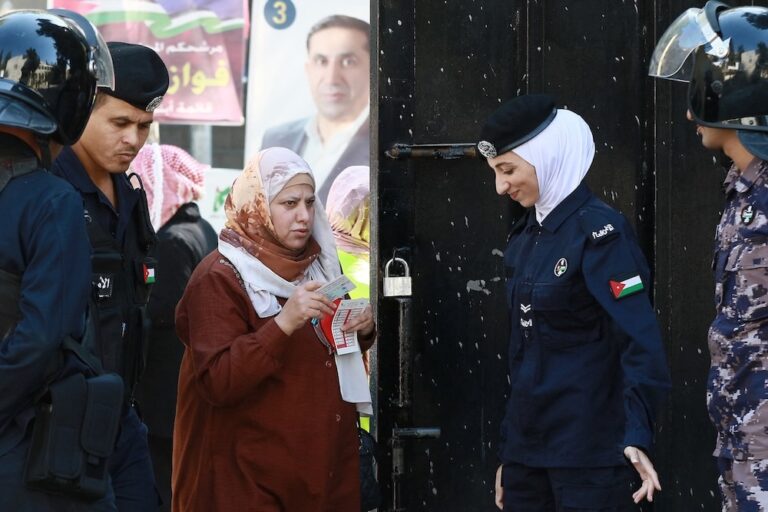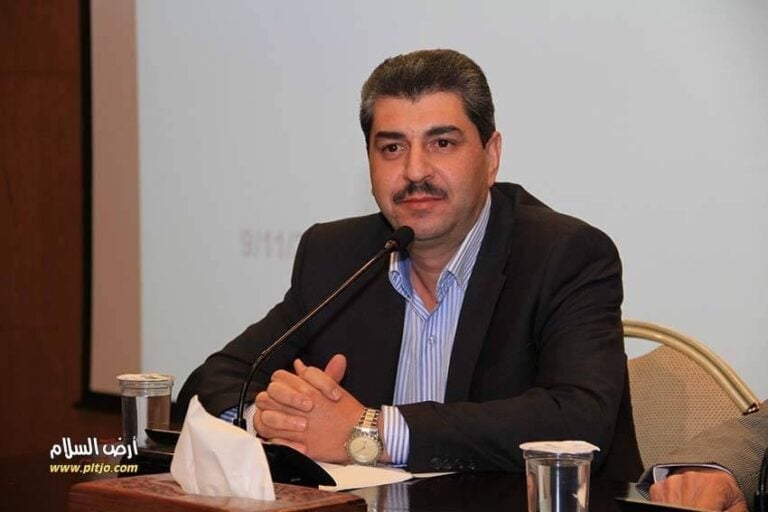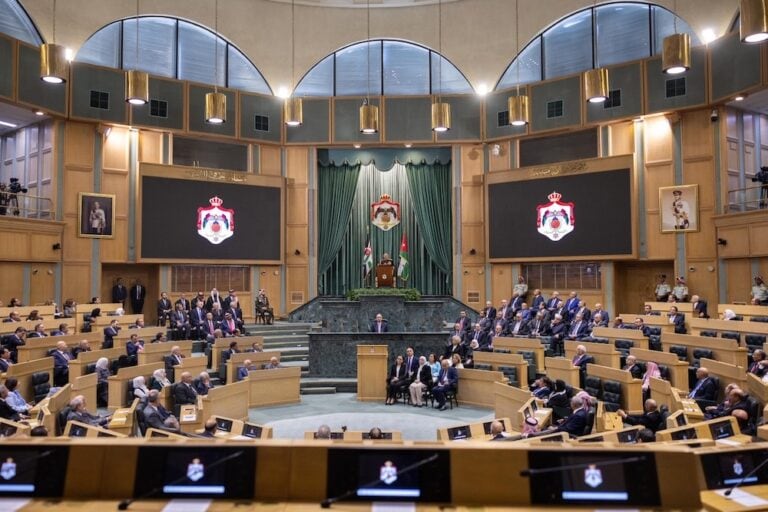Authorities use vague and abusive laws that criminalize speech, association, and assembly.
This statement was originally published on hrw.org on 18 September 2022.
Detentions, Interrogations, Harassment and Restrictions on Basic Rights
Civic space in Jordan has shrunk over the past four years as authorities persecute and harass citizens organizing peacefully and engaging in political dissent, Human Rights Watch said today.
The authorities use vague and abusive laws that criminalize speech, association, and assembly, Human Rights Watch found. The authorities detain, interrogate, and harass journalists, political activists, and members of political parties and independent trade unions, and their family members, and restrict their access to basic rights, such as work and travel, to quash political dissent.
“There is an urgent need to address the downward spiral on rights we are seeing in Jordan today,” said Lama Fakih, Middle East director at Human Rights Watch. “‘Maintaining stability’ can never be a justification for abusing people’s rights and closing space that every society needs.”
Human Rights Watch investigated 30 cases between 2019 and 2022 in which authorities used overly broad criminal defamation provisions to arrest and charge citizens for peacefully expressing political opinions on social media platforms or in public gatherings. Human Rights Watch also asked 42 Jordanian activists to provide written responses to a survey about their experiences with law enforcement agencies.
Jordan’s authorities are using vague and overly broad criminal provisions including under the Penal Code of 1960, the Cybercrime Law of 2015, the Anti-Terrorism Law of 2006, and the Crime Prevention Law of 1954 to suppress free speech and assembly. The declaration of the state of emergency following the onset of the coronavirus pandemic in 2020 has also given the prime minister sweeping powers to further curtail civil and political rights. In 2020, the number of cases relating to these charges almost doubled from the previous year, according to the annual reports from the National Center for Human Rights (NCHR). Taken together, these practices amount to a systematic campaign to quell peaceful opposition and silence critical voices, Human Rights Watch said.
Relatives of those targeted and others with direct knowledge of the cases said that in several cases, detainees were placed in solitary confinement and denied access to lawyers and families. In most cases, the country’s two primary security agencies, the General Intelligence Department (GID) and the Preventative Security department of the Public Security Directorate (PSD), were responsible for the arrests. In some cases, those arrested were charged, but charges were later dropped. In others, people were detained for long periods but not charged. A small number of cases resulted in prosecution. In several cases, General Intelligence told people to sign a pledge not to insult the king or the intelligence services.
The Jordanian government has also dissolved political parties and independently elected trade unions after members exercised their right to protest and express political opposition. In 2020, following a high-level dispute between the government and the teachers’ union over salaries, the authorities raided and arrested union board members, then dissolved the union.
Human Rights Watch previously documented how Jordanian authorities have limited media freedom in recent years through sweeping gag orders, harassment, and arrests in order to control and restrict reporting on sensitive issues.
In February 2021, King Abdullah II sent a letter to the head of General Intelligence asking him to limit the department’s involvement in non-intelligence related matters. In June 2021, the king convened the Royal Committee to Modernize the Political System, which issued recommendations for amending laws on political parties and elections, and other legislations that would allow for further engagement in the country’s political life. The recommendations emphasized the need for “full respect for human rights and the creation of a safe space for fundamental freedoms that would enable political participation.”
Despite these high-level calls for reform, little has changed, Human Rights Watch said. In December 2021, CIVICUS Monitor, an organization that collects data on the situation for civil society in 197 countries, downgraded Jordan’s civic space rating from “obstructed” to “repressed.”
Under international human rights law, freedom of expression, assembly, and association are recognized as fundamental human rights, often overlapping, and essential to the effective functioning of a democratic society and to the enjoyment of other individual rights. Human rights treaties, including the International Covenant on Civil and Political Rights (ICCPR) to which Jordan is party, permit restrictions on freedom of speech and assembly only if they are provided for by law, are strictly necessary and proportionate to achieve a legitimate aim, including the protection of national security, public order or public health, and morals, and are nondiscriminatory. In no case may restrictions be applied or invoked in a manner that would impair the essence of a human right.
Jordan’s partners and donors, such as the United States and European Union, provide direct assistance and training to Jordan’s security agencies. These donors have highlighted democratic governance and rule of law reforms as key objectives of their economic and political cooperation with Jordan, but these programs have done little to halt the visible deterioration of basic rights.
Jordanian authorities should extend the country’s political reform program by undertaking concrete measures that would alleviate the growing repression that restricts civic space and political participation in the first place, Human Rights Watch said. Such measures should include amending vaguely worded legislation that authorities use to curtail basic rights as well as halting all informal harassment and persecution using the legal system of Jordanians who seek to peacefully express their views and form independent groups.
“It is doubtful that Jordan’s political reform program will succeed in the face of a deterioration of freedom of speech, assembly, and association across the country,” Fakih said. “Jordanian authorities should take urgent steps to reverse the closure of civil space and allow Jordanians to fully participate in the social and political life of the country without hinderance.”
Abusive Legal Framework
In the last four years, Jordan’s authorities have increasingly used vaguely worded criminal laws to prosecute citizens for peacefully expressing political opinions on social media platforms or in public gatherings.
Human Rights Watch investigated 84 government charges in 30 cases in which the authorities used such laws between 2019 and 2022. In 63 cases, the authorities used criminal defamation provisions under the Penal Code of 1960, including article 132, which allows for the prosecution of citizens “who broadcast fake or exaggerated news that would undermine the prestige of the state.” Such provisions cast a wide net for what constitutes defamation and give authorities significant leeway to pursue charges without any clear connection to criminal wrongdoing, with a chilling effect on freedom of expression.
To extend the reach of these provisions to the use of social media and the internet, the authorities have also used the Cybercrime Law of 2015, which, under article 11, stipulates a penalty for anyone who intentionally sends, resends, or publishes libel or slander with imprisonment for a period of no less than three months and a fine of no less than 100 JDs (US$141) and a maximum of 2,000 JDs ($2,820). The authorities also frequently use article 15, which criminalizes use of the internet or information network to carry out acts that are punishable by other legislation.



